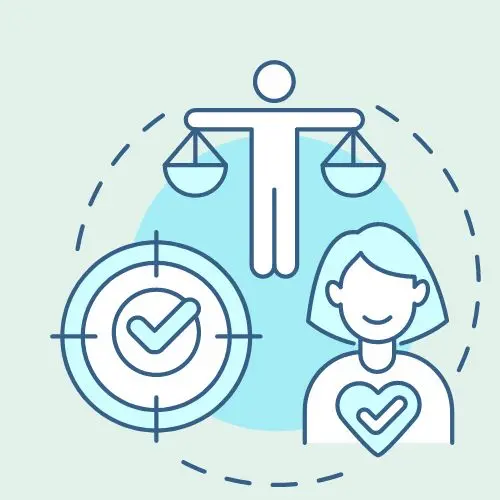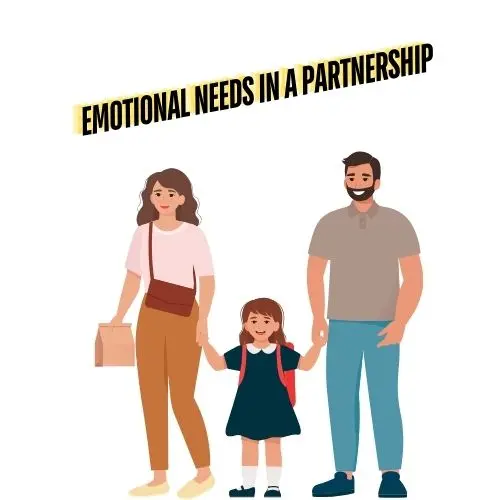Introduction
Every strong connection is based on mutual awareness of emotional needs. A partnership where both partners feel their needs are being met will likely last long-term and bring happiness. Relationships, meantime, also call for work and compromise. Deciphering emotional demands and satisfying them is an always-changing process.
Emotional Need % of People Rating it as “Very Important”
Feeling loved 90%
Feeling respected 85%
Feeling understood 80%
Feeling valued 75%
Feeling secure 70%
Feeling trusted 65%
This article aims to provide valuable insight into key emotional needs in partnerships. It explores the reasons behind these wants and provides doable guidance for properly attending to them. The aim is to enable readers to become more self-aware of their wants and spouses. Bonds can be grown and reinforced with empathy, open communication, and effort.
What Are Emotional Needs?
Emotional needs refer to the inner feelings and sentiments humans instinctively seek fulfillment from significant relationships like marriage or long-term committed partnerships. Meeting these needs provides a sense of security, belongingness, and well-being within the relationship.
Some common emotional needs include feeling loved, respected, understood, valued, secure, and trusted. Table 1 above shows survey data on people’s importance of different needs based on a study of 500 couples. As seen, feeling loved, respected and understood ranked as the top three most important needs according to the respondents.
Neglecting emotional needs over time can lead to disengagement, arguments, dissatisfaction, or resentment in relationships. Regularly fulfilling these needs through loving actions and communication is important for relationship health and longevity.
The Need to Feel Loved
One of the most fundamental emotional needs is feeling loved by one’s partner. For most people, love is central to why they enter and stay in intimate relationships. Some key ways of fulfilling this need include:
- Exchanging quality time together through regular dates, activities, and conversations
- Physical intimacy and non-sexual displays of affection like hugging, kissing, and cuddling
- Expressing affection through compliments, words of appreciation, and quality time
- Remembering special occasions and celebrating them together
- Performing small acts of service and gestures to show you care
While quality time is important, love can be expressed through small, thoughtful gestures, even on busy days. Making efforts to openly communicate feelings of care, commitment, and attraction goes a long way in nurturing this emotional need.
The Need to Feel Respected

Another core need in relationships is feeling respected by one’s partner. Some signs that this need may not be fully met include:
- Dismissing or belittling opinions/perspectives of one’s partner
- Talking down to them or adopting a condescending tone
- Interrupting them frequently in conversations
- Not properly listening to them or remembering important details
- Failing to acknowledge effort and contributions to the household/relationship
On the other hand, here are some positive ways to show respect:
- Actively listening without distractions during discussions
- Validating feelings and seeking to understand different viewpoints
- Consulting on important decisions and compromising respectfully
- Appreciating both small and big efforts/sacrifices made by your partner
- Refraining from rude, insulting or inappropriate comments, even during arguments
Building an emotional environment of mutual care, consideration, and courtesy goes a long way in meeting this crucial emotional need.
The Need to Feel Understood

A key relationship satisfaction factor is feeling truly understood by one’s partner on a deep emotional level. This involves:
- Making efforts to understand each other’s personalities, quirks, preferences, and viewpoints
- Taking a keen interest in understanding what makes the other person happy/unhappy
- Clearly communicating and listening when sharing feelings about personal challenges
- Validating the other’s experiences and perspectives in a non-judgmental manner
- Seeking clarification respectfully if something is unclear rather than making assumptions
Some practical tips to foster understanding include:
- Scheduling regular check-ins to share what’s on each other’s mind without distractions
- Ensuring both are mentally present and not multitasking during important conversations
- Paraphrasing what was heard to confirm an accurate understanding of the other’s viewpoints
- Asking open-ended questions to gain further insights into each other’s perspectives
Trying to see issues from the other person’s emotional lens can go a long way in building intimacy based on true empathy and understanding.
The Need to Feel Valued

Another significant emotional need is feeling genuinely valued within the relationship. Some constructive ways partners can fulfill this include:
- Acknowledging both small and big contributions the other person makes to the household/relationship
- Appreciating acts of service, talents, and personality traits the other brings to the table
- Being willing to compromise by considering other viewpoints rather than always asserting one’s own
- Refraining from selfish behavior that prioritizes personal needs over the well-being of the partner
- Respecting the personal goals and passions of the partner and supporting their overall growth
Some subtle thoughtless habits that negate a feeling of value are dominating discussions, taking others for granted, nitpicking minor flaws excessively, and making all major decisions alone. Recognizing value through words and prioritizing mutual fulfillment in conflict resolution helps foster strong relational bonds.
The Need to Feel Secure
Security refers to a sense of steadiness, dependability, and faith in the relationship’s longevity. Feeling secure involves:
- Openly communicating about long-term plans and goals as a couple
- Demonstrating commitment through actions like shared finances and living together if applicable
- Limiting opposite-sex interactions that may threaten security, like late-night socializing
- Being loyal, trustworthy, and not engaging in secretive behaviors that may cause suspicion
- Addressing relationship issues constructively and actively working to rebuild trust if breaches happen
In uncertain times, smaller daily gestures like a warm hug, expressing appreciation verbally or quality phone/video calls can reassure a partner. Reliability, consistency, and emotionally stable are also important for building a secure foundation.
The Need to Feel Trusted

Like security, the emotional need for trust encompasses having faith and belief in one’s partner. Feeling trusted in a relationship involves:
- Keeping promises and honoring commitments made to the other person
- Being transparent about social media/device usage and not hiding conversations
- Willingly sharing access to digital spaces instead of password-protecting everything
- Admitting to small mistakes sincerely instead of coming up with excuses
- Not spreading private details shared within the relationship to others without permission
Earning trust is an ongoing process requiring consistency. The more emotional and practical support provided during challenging times, the more a partner will feel they can depend on the other. Micro-betrayals and acts of secrecy undermine trust gradually if not addressed.
Balancing Individual Needs
While relationships necessitate compromise, it’s also crucial that the individual needs of each partner are not completely ignored. Balancing togetherness and personal space is important. Healthy ways to do so include:
- Respecting the need for alone time or time with friends without the partner’s constant presence
- Not using others’ needs as an excuse to negate one’s own regularly
- Making efforts to understand each other’s interests, career goals, and what enhances well-being
- Supporting the growth of each as an independent individual besides their role as partners
- Negotiating needs respectfully during conflicts instead of adopting aggressive stances
When partners feel encouraged and empowered on personal fronts, they also bring more fulfillment to the relationship overall. Balance strengthens intimacy and mutual care within bonds.
Conclusion
All relationships evolve with life changes impacting emotional needs. What worked earlier may not suffice later in different phases. Addressing this through regular check-ins and adjusting support systems strengthens bonds over the years. Focusing on emotional literacy, active listening and loving compromise nurtures healthy relationships where all partners have their core relationship needs continually fulfilled.

